Pressure Washer Buying Guide: Which Type Do You Need To Buy?
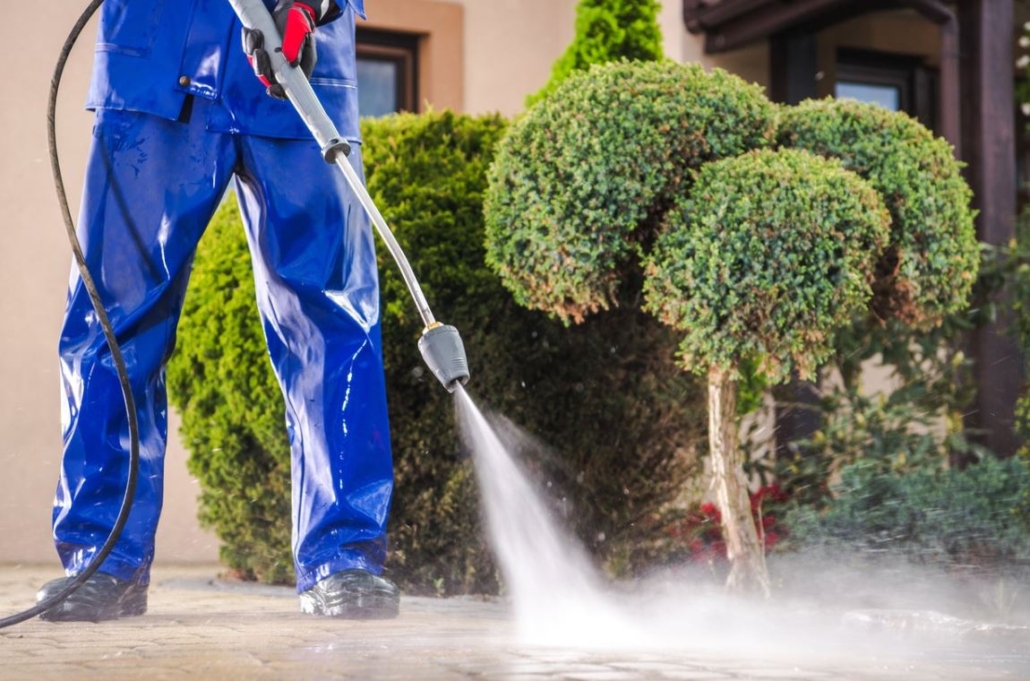
There are so many things consumers love about their pressure washers. It is ideal for removing tough-to-remove stains on your deck, patios, steps, walkways, and more.
Some of the best pressure washers can erase months, if not years, of stains.
It allows you to give your patio a whole new look without even considering how much replacing it will cost. This means saving thousands of dollars in the long run!
And while pressure washers come with endless benefits, they still need to be used with caution.
Pressure washers are designed to deliver a powerful stream of water that can cause severe bodily harm and extensive property damage.
If you want to explore more about pressure washers, how they work, essential features to note, and more, continue reading!
Topic Overview
A pressure washer helps clean large sections of outdoor hard surfaces. A pressure washer is useful for cleaning various surfaces, including concrete, asphalt, and wood.
Here is your complete guide to everything you need to know about pressure washers!
How Do Pressure Washers Work?
There is a wide variety of design and functionality options available for pressure washers. They either use an electric motor or a gas engine to power a pump, which generates the water to be expelled at a concentrated force through a nozzle.
This concentrated force is released at such a high pressure that it can wash away months or years of accumulated dirt, residue, and grime on most surfaces. This includes decks, patios, and driveways.
Other items pressure washers are used for are outdoor chairs, cars, and more—compared to using a scrubbing brush and hose, this method is much faster.
What Is PSI in a Pressure Washer?
A pressure washer’s flow rate quantifies power in gallons per minute (GPM) and PSI (pounds per square inch).
A greater PSI means a more efficient and effective pressure washer. Think about the tasks to decide on the appropriate washer power pressure.
What PSI do I need for the pressure washer?
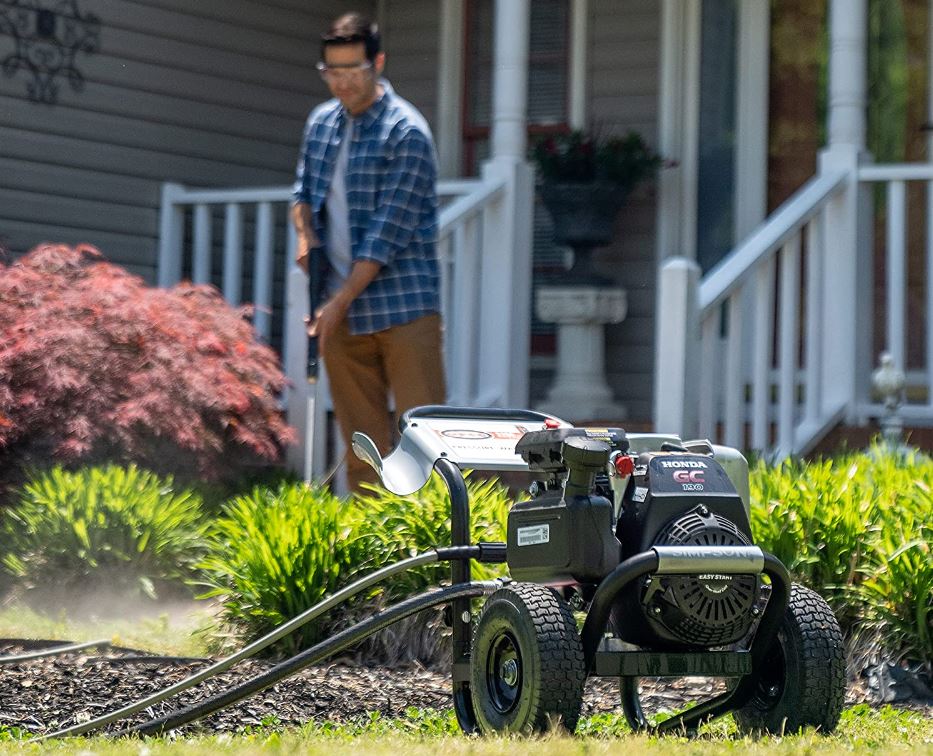
Light-duty (Consumer):
The most effective pressures for this task are electric ones. These are ideal for less demanding tasks around the house and typically have a PSI rating of 1300 to 1900 at 2 GPM.
Suitable for use on automobiles, outdoor furniture, and barbecues.
Medium-Duty (Semi-Professional):
2-3 GPM at 2000-2800 per Square Inch (PSI). Gas-powered pressure washers are typically more robust and powerful than electric ones, making cleaning surfaces like siding, fences, decks, and driveways simpler.
Heavy-duty (Professional Grade):
These models have a more powerful motor and pump rated at 3-4 GPM and 2800 PSI or above. This washer is ideal for large-scale cleaning projects, such as washing down a 2-story building, eradicating graffiti, or stripping paint.
Things To Keep In Mind When Buying A Pressure Washer
Length of the Hose
Measuring in meters, the hose runs from the control panel to the trigger gun. It’s essential to think about whether or not the length of the hose that comes with the pressure washer is adequate for the tasks you’ll be doing most regularly.
Lances
The water output can be modified further by attaching lances to the trigger pistol. With specific models, you may adjust the water pressure up or down without noticing a difference in your water bill.
On select Karcher models, you’ll find a full-control lance, a feature you want to consider getting. The full control lance feature offers a wide range of pressure adjustments at your fingertips.
Wheels and Handles
Find a pressure washer with a handle and wheels if you want to clean large areas like a patio or deck or if you plan to store it somewhere other than where you’ll use it.
Power on/off by itself
This is an excellent addition for anyone concerned with conserving water. Instead of manually turning on and off the water flow, auto start/stop devices have the operator pull a trigger on the pressure washer.
You can save water and detergent by getting into the working position before turning on the water.
Rate of Water Flow
The quantity of water flowing through a pipe is often expressed in liters per minute or hour. Combining a high water flow rate with a high PSI should result in effective cleaning and rinsing.
Type and Capacity of Motor or Engine
Look at the wattage for electric pressure washers and the cubic centimeters or Horsepower for gas-powered ones: the greater the number, the more robust and durable the pressure washer.
Connectivity of Water Butts
If your pressure washer has a water butt connection, you can buy an adapter to link it to your water supply.
This allows you to save money and help the environment by using the rainwater you gather in your water butt for all your pressure washing needs.
Different Types Of Pressure Washers To Consider
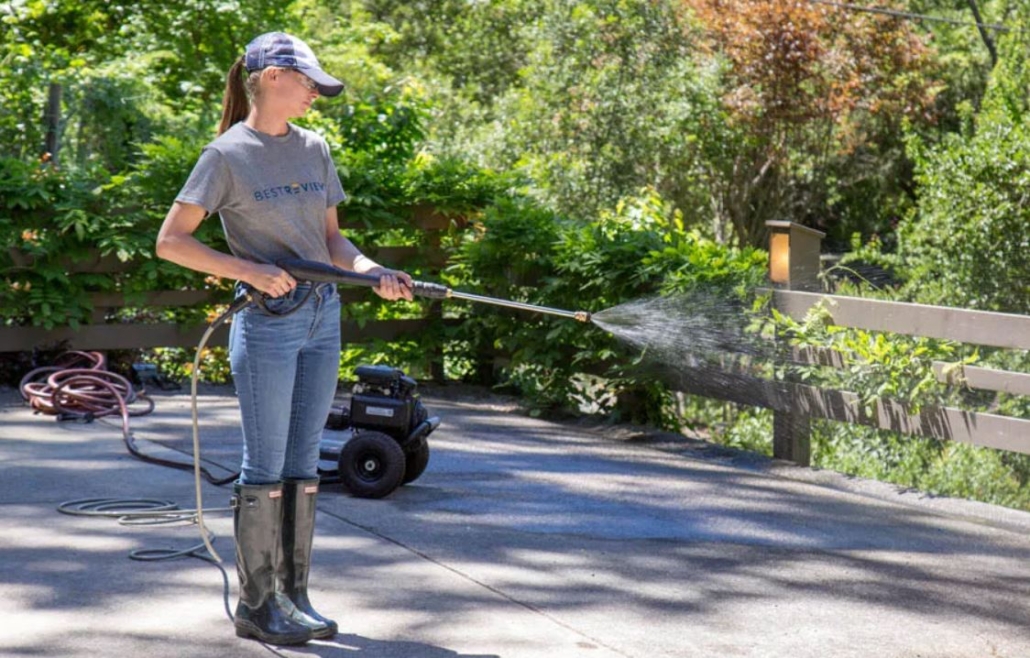
Electric Pressure Washer
Overview
Electric pressure washers augment garden hose water pressure with an electric motor or pump.
Who Should Buy
This is for the homeowner who needs to clean light dirt and some debris off their patio.
Pros And Cons
Pros:
- Best for small decks, patios, outdoor furniture, and other cleaning jobs.
- The models are light, silent, low-maintenance, and emission-free.
- They start/stop quickly.
- They don’t need winterizing if taken indoors and are easy to store.
Cons:
- Lower water pressure slows cleaning.
- Plastic wands and nozzles replace gas-powered models’ metal fittings.
- Your cleaning area is restricted by cord and hose length.
- Power cords for hoses are around 35 feet long.
Gas Pressure Washer
Overview
Gas pressure washers are similar to an electric pressure washers, except they have a gas pump.
Who Should Buy
Because gas pressure washers are much more powerful than electric, they are generally used by professionals requiring a higher PSI and GPM.
Pros And Cons
Pros:
- Gas-powered power washers clean faster and with greater force than electric ones.
- They also have a higher PSI and faster cleaning rates.
Cons:
- They’re noisy, more expensive, require gasoline, and produce carbon monoxide.
A Comparison Of Washers
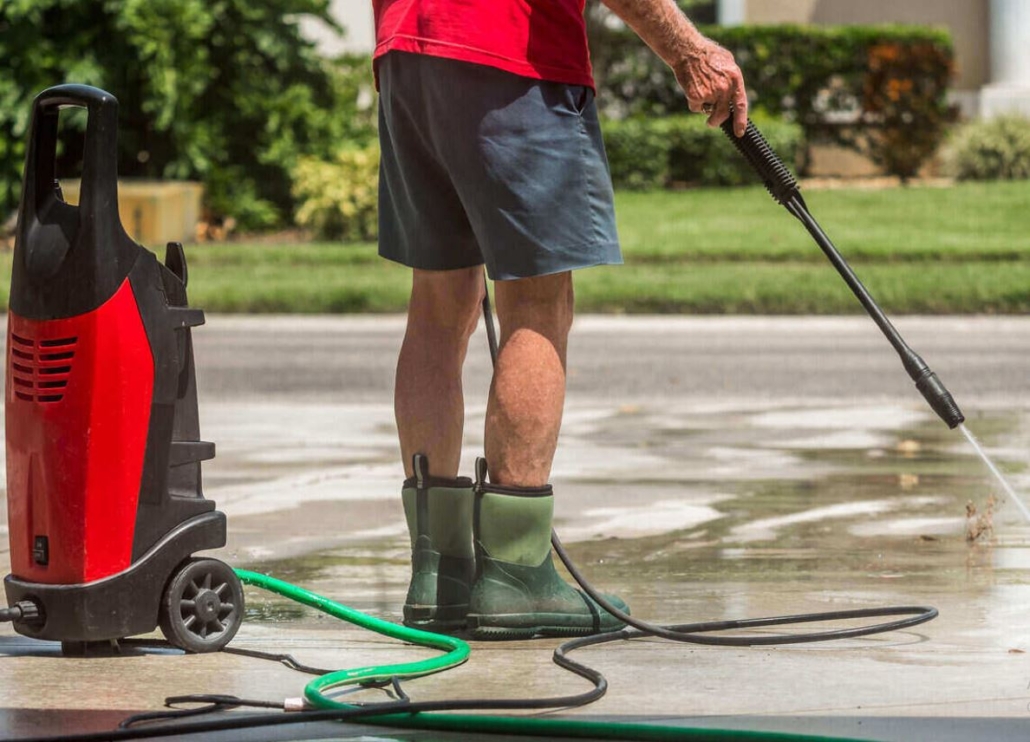
Electric Pressure Washer vs. Gas – Which Is Better?
These kinds of washers work well for low-pressure applications. Particularly for those who want to use it around the house.
Pressure Washers that use electricity are low-noise, low-weight, and low-maintenance. They take up little space and may be quickly fired up.
Always follow the manufacturer’s instructions when using an extension cable with an electric washer.
Pressure washers powered by gas engines often deliver more power than their electric counterparts.
They’re louder to those around you, not to mention heavier and more troublesome to keep in working order.
However, mobility is an advantage of gas-powered washers, especially for larger projects like washing sidewalks and more. Wearing earplugs while operating a gas-powered washer is highly recommended.
Corded Vs. Cordless Pressure Washer – Which Is Better?
Cordless pressure washers have significantly less weight than their corded counterparts. This facilitates their portability and usability.
On the other hand, cordless pressure washers are more convenient because there is no cord to plug in and no line to be tripped over—minimizing the risk of injury on site.
These pressure washers can be used for those who need to transport pressure washers from different locations efficiently.
However, if you use them on a job, perhaps cordless would be the more appropriate option.
Pressure Washer Nozzles: All You Need To Know
The angle of these adjustable nozzles can be adjusted from zero to sixty-five degrees.
The spray will be more concentrated and potent at lower degrees. Extra nozzles or tips are often included with pressure washers for various tasks.
An important risk associated with pressure washers is the direction and force with which the water is sprayed.
The pressure washer’s nozzle allows for this adjustment. When it comes to pressure washers, you may choose from various brands.
Nozzles that can be adjusted by twisting are preferable to those that must be replaced because it only takes a second to alter the spray pattern or width.
However, interchangeable nozzles make it possible to change the spray pattern by choosing a new spray angle.
Avoid damage by never adjusting an adjustable nozzle to its lowest setting and never using the red zero-degree replacement nozzle. The task can be completed safely using higher-degree nozzles or settings.
Pressure Washer Vs. Power Washer
Power washing is different primarily because it involves the use of heat in addition to water pressure.
To clean various surfaces, both types use a high-pressure water spray. It serves the same purposes, but it goes about it differently.
Pressure Washer Vs. Garden House
While a pressure washer’s water sprays out with more power, it consumes roughly half as much water as a standard garden hose.
Regular pressure washers consume between two and five GPM, while a standard hose can produce between six and ten GPM.
Is A Pressure Washer Worth Buying Overall?
Pressure washers are worth buying if it is something you need to use every day or at least weekly.
However, if you only tend to wash your patio once or twice a year, you might consider renting a pressure washer first.
If you find you need it more than you had anticipated, then perhaps consider purchasing one.
Other Factors To Keep In Mind
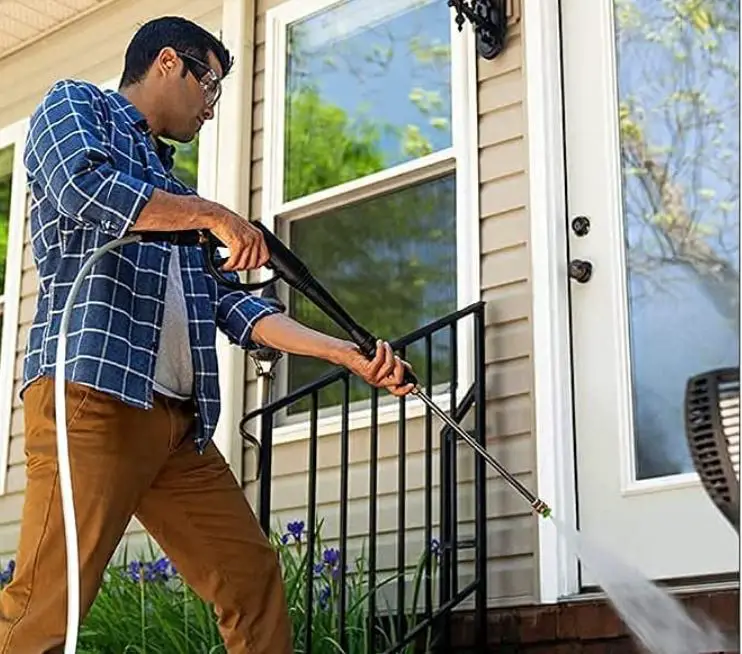
What’s PSI?
PSI is how much pressure the power washer’s water spray has when it hits a surface. In an ideal world, the device would be strong enough to displace one substance with another.
Does the PSI allow you to remove paint off your home, tar from your pathway, mold from concrete, or filth and grime from your car?
A more powerful and efficient pressure washer is achieved by increasing the PSI.
What’s GPM?
GPM or gallons per minute, essentially how low or high the water will flow out of the pressure washer.
The larger the surface or the dirtier, the greater the GPM you would want. This will allow it to be cleaned a lot quicker in a lot less time.
What’s CU?
Cleaning units allow the consumer to gauge the effectiveness of the pressure washer in question.
Typically, PSI and GPM are multiplied to work out a pressure washer’s cleaning units. This gives consumers a good gauge of the performance of the tool.
Our Best Pressure Washer– Mini-Reviews
Best Overall Pressure Washer
Generac 7122 SpeedWash
- One-touch electric start enables reliable, easy starts.
- Horizontal Generac OHV engine has 4x longer life and 3x longer operating time than vertical shaft engines.
- Included lithium-ion battery and charger (battery will provide up to 50 starts).
- PowerDial cannon adjusts pressure for automobiles, wood, concrete, and soap.
Best Electric Pressure Washer
Sun Joe SPX3000
- Performance:5-Amp/1800-watt motor generates up to 2030 PSI (at initial discharge) and 1.76 GPM (with nozzle open at minimum pressure) flow. And can clean anything from outdoor furniture to driveways and trucks.
- TSS (Total Stop System): Shuts off the pump when the trigger isn’t engaged to save energy and prolong pump life.
Best Gas Pressure Washer
SIMPSON Cleaning MSH3125 MegaShot
- Performance: With its Honda GC190 Premium household engine, the MegaShot power washer is perfect for washing decks and patios and prepping home exteriors for painting.
- Durability: OEM Technologies axial cam pump provides 3200 PSI at 2.5 GPM and has thermal relief to prevent overheating; Powder-coated welded steel improves durability.
- Portability: The slim design is lightweight and portable; 10-inch quality pneumatic tires provide maneuverability on rugged terrain.
FAQs
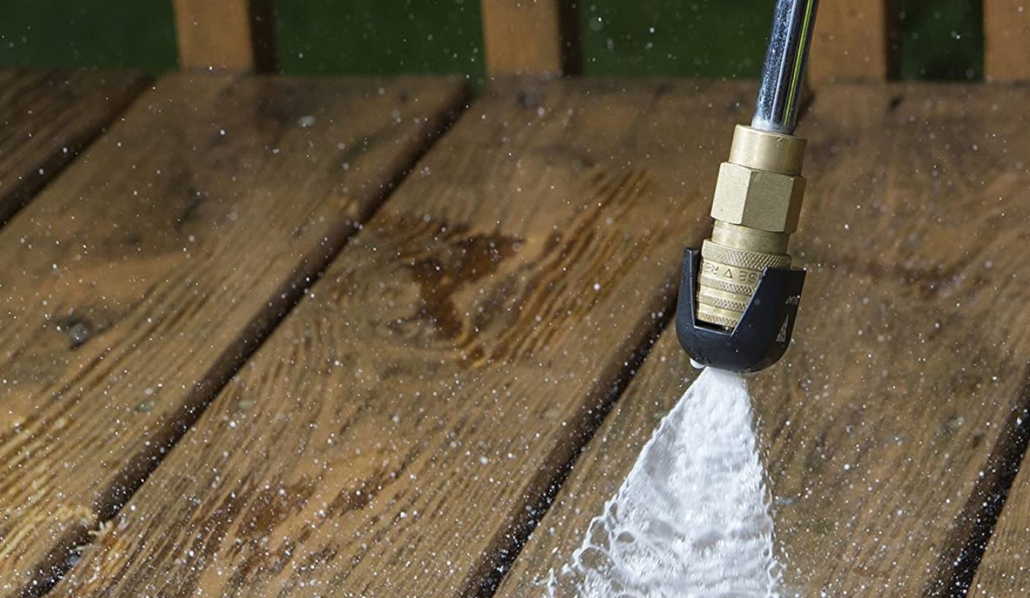
Q: Will a pressure washer with 1600 PSI be able to clean concrete?
Use a pressure washer with 3000 psi and 4 gallons per minute (GPM) to clean concrete.
Q: Can you wash a car with a 3000 PSI pressure washer?
3000 PSI is too high to wash a car; it could harm the paint or produce dents. If you’re merely cleaning cars, you don’t need 150 bar (2’180 psi) or greater pressure.
Q: Is a car’s recommended PSI of 1800 too high??
1600–1900 PSI is safe for your automobile.
Q: How many PSI is most car washes?
Car washes usually spray at 1,000 to 1,200 PSI but can reach 2,200.
Q: What PSI Do I need to clean my deck?
Choosing the lowest pressure level that is still effective when washing a wooden deck is advisable. Typically, this ranges from 500 to 600 PSI for pine and cedar, two softwoods. It can go up to 1200–1500 PSI for harder timbers.
Q: Why is my deck fuzzy after pressure washing?
The exterior layer of decayed wood is stripped away during a pressure wash, giving the impression that the wood is covered in tiny, fuzzy hairs. The fibers of the wood have been torn, leading to this effect. This is perfectly natural and not a sign of damage. In most cases, after two or three weeks, these fuzzies will disappear.
Q: Just how much PSI do I need to pressure wash bricks??
When washing the brick outside your home, use only very little pressure. Masonry should be cleaned with a pressure washer between 500 and 1000 PSI. To prevent damage, several experts employ pressures between 100 and 1500 PSI.
Q: Should I seal my deck after power washing?
Sealing a deck after pressure washing will require some time to allow the wood to dry. Applying stain too soon after cleaning will prevent the stain from binding correctly to the damp wood. The coat will be thinner, as a result, making it less durable and more susceptible to being washed away in the rain.
Q: What is the most common problem with pressure washers?
Different faults might occur, but usually, either the engine or the pump/wand is the source of the problem. Therefore, upkeep is necessary.
Q: How long can a pressure washer run without spraying?
Don’t Let the Machine Run Without Triggering. Triggering a pressure washer releases the pressure. Two minutes or more without water spraying could damage the pump.
Q: What should you not do with a pressure washer?
Pressure-wash humans, pets, or plants. Pressure washer water can inflict bodily injury (even penetrate the skin) and kill plants. Always wear safety eyewear when pressure washing acceptable surfaces.
Q: How long can a pressure washer run?
Gas pressure washers can run for 30 minutes without stopping. Electric models typically last an hour. Using a hot water pressure washer requires 15-minute pauses.
Q: What happens if you run a pressure washer without water?
Dry starting your pressure washer causes premature wear on all of its internal parts. As the motor turns the friction-heavy pump, it overheats. Overheated engines might freeze up or fail.
Q: Do power washers overheat?
Yes, pressure washers overheat.
Final Say
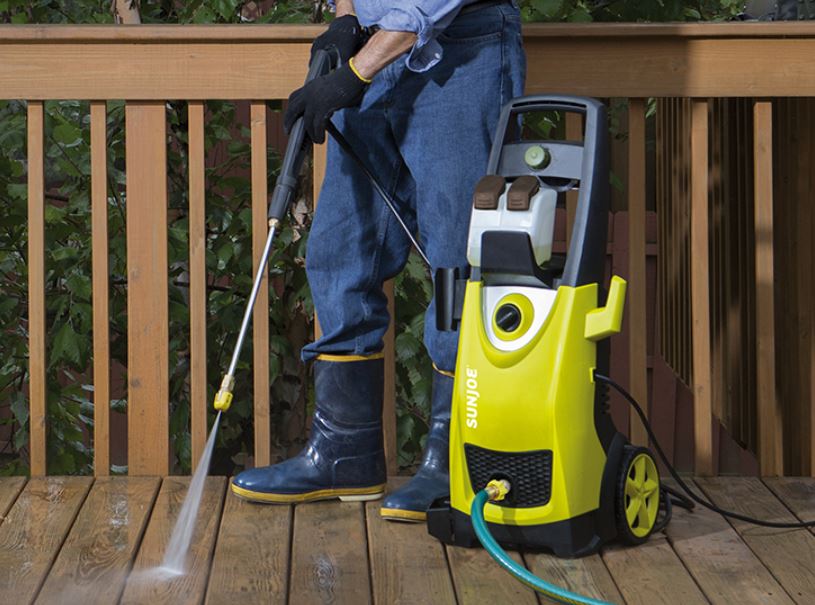
There are advantages and disadvantages to using a pressure washer. When employing a pressure washer, you must never forget to use the device for the task it was designed.
Before you begin, it is recommended that you read the user handbook. Spraying another person, pet or plant can result in severe injuries and should be avoided at all costs.
You should perform a test wash on the surface you’re cleaning in an area that won’t be seen to determine the appropriate pressure tip.



